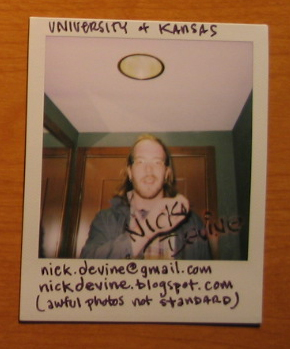I don’t think I’ll ever know who makes things the way they are. And it doesn’t matter […] It doesn’t matter who hires me, because they’re all guilty or they’re all being used by those who are. It’s like being surrounded. Wherever you shoot you hit the enemy […] What I do is like throwing a rock into a pool. The splash doesn’t matter, only the circles it makes. (Andrew Vachss)
Thursday, May 24, 2007
Friday, May 11, 2007
Wednesday, May 09, 2007
excerpt from a short essay
[This is from a class i should have taken four years ago, but ended up taking as a super senior. My teacher Emily Robbins saved me with decidedly interesting topics, thanks Emily, comp II couldn't have been better]
Percy is, in the end, undeniably correct in his breakdown of experience and it’s culturally tainted undertones. Where I think he is faulty is in his generalized reproach of educational packaging. For example, when Percy speaks about the difference between a person dissecting a dogfish on the shore versus in the classroom he implies that we as assumptive beings are incapable of escaping the institutionally imposed formatting or standardization of thought without being an atypically astute student. In reality though aren’t the conditions laid before us, within the classroom, similar to those forced upon us by nature. Aren’t there benefits to precedent in our undeniably post-modern station, and aren’t those the only reason we can approach situations like these comfortably without any severe sense of wonder. Allowing us to stroll precariously the borderline between modern and ancient
mysticism. I’d say that the actual problem at hand isn’t how or where we receive the information, but that many times each of us as individual learning entities takes the information for granted. Passive acceptance happens in the natural world just as it happens in our current state of industrialized commodification.
I do recognize the difference between what he calls “common” and “complex” approaches to understanding, and I can see the value in his pragmatic approach to perception, but in the end isn’t it the variation between each individuals assumptions that become the most valuable aspect of culture. What would we be without the transference of knowledge, and it’s eventual transition into accepted wisdom? In short, we would be less intelligent than a majority of the earth’s creatures, perpetually pure, and prone to eating poisonous berries all the time.
The problem isn’t the situation itself but the possibility that an individual is unaware of variation within the situation. Complete freedom is slavery. To be progressive and effective one must take into account the nature of the information afforded them and the context of the environment in which it is learnt / taught. In this format methods can become less relevant, and the educator can rely more upon the curiosity of individuals working with, not necessarily within, the parameters suggested them. Thus allowing context to inspire not dictate.
Percy is, in the end, undeniably correct in his breakdown of experience and it’s culturally tainted undertones. Where I think he is faulty is in his generalized reproach of educational packaging. For example, when Percy speaks about the difference between a person dissecting a dogfish on the shore versus in the classroom he implies that we as assumptive beings are incapable of escaping the institutionally imposed formatting or standardization of thought without being an atypically astute student. In reality though aren’t the conditions laid before us, within the classroom, similar to those forced upon us by nature. Aren’t there benefits to precedent in our undeniably post-modern station, and aren’t those the only reason we can approach situations like these comfortably without any severe sense of wonder. Allowing us to stroll precariously the borderline between modern and ancient
mysticism. I’d say that the actual problem at hand isn’t how or where we receive the information, but that many times each of us as individual learning entities takes the information for granted. Passive acceptance happens in the natural world just as it happens in our current state of industrialized commodification.
I do recognize the difference between what he calls “common” and “complex” approaches to understanding, and I can see the value in his pragmatic approach to perception, but in the end isn’t it the variation between each individuals assumptions that become the most valuable aspect of culture. What would we be without the transference of knowledge, and it’s eventual transition into accepted wisdom? In short, we would be less intelligent than a majority of the earth’s creatures, perpetually pure, and prone to eating poisonous berries all the time.
The problem isn’t the situation itself but the possibility that an individual is unaware of variation within the situation. Complete freedom is slavery. To be progressive and effective one must take into account the nature of the information afforded them and the context of the environment in which it is learnt / taught. In this format methods can become less relevant, and the educator can rely more upon the curiosity of individuals working with, not necessarily within, the parameters suggested them. Thus allowing context to inspire not dictate.
Subscribe to:
Posts (Atom)

